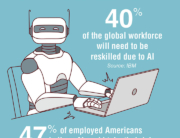We include developments from the Staffing Industry Daily News and The Staffing Stream to help you focus on emerging movements that could shape your business for the better.
Feelin’ Groovy?
Some employers loosen drug-test requirements.
Some US employers are overhauling their drug testing practices based on the belief that overly broad testing eliminates valuable talent from the applicant pool, particularly in states where marijuana use has been legalized in some form, according to a survey by Express Employment Professionals.
Get With It
Lacking digital tools leads to employee turnover.
A company’s reputation and utilization of digital tools plays a large role in the attraction and retention of talent, according to Randstad US’s “Workplace 2025: The Post-Digital Frontier” study. Four in 10 employees have already left a job because they didn’t have access to the latest digital tools, and 58% reported the need to seek new employment in order to secure digital skills.
Say What?
Employees offer bizarre excuses for being late to work.
A quarter of workers in a recent CareerBuilder survey admitted they come in late to work at least once a month. Twelve percent said it’s a weekly occurrence.
Among the strangest excuses given their employers:
- I had morning sickness (from a man)
- My coffee was too hot and I couldn’t leave until it cooled off
- My dog ate my work schedule
- My fake eyelashes were stuck together
Close the Gap
Pay gap caused by fewer women in higher-paying roles.
The pay gap between men and women in the US is real, but predominately caused by fewer women than men in higher-paying roles, according to Korn Ferry International Inc. Women earn nearly 20% less than men as a whole, the company said, but the gap narrows when comparing women and men in the same jobs.
Be Serious
Get your staff to take cybersecurity seriously.
Regardless of the type of business you run, your cybersecurity needs to be top-notch and on par with modern standards. And even then, no one can guarantee that safety. Why? Because of the biggest security flaw there is: the human factor.
Improper security training, an abstract approach toward security issues and various other reasons lead to the point where your employees simply don’t understand in which ways they jeopardize your business’ security. There are some things you can do to help educate your workers and coworkers and increase the overall safety of your business:
Continuous training. The best results come from a continuous training that takes place throughout the year. You need to train your employees according to their working positions and the security risks that may concern their specific job.
Perform training exercises. In order to fully understand all the potential security breaches your company is facing, you need to perform a number of “live fire” exercises. This means that you will have to find a way to simulate a cybersecurity attack so that you can see the response.
Evaluation, communication and reward. Do regular checkups and periodic evaluations of both your employees and your security systems and strategies. Make sure you’ve tested them thoroughly before any implementation.
Source: “Getting Your Staff to Take Cybersecurity Seriously,” The Staffing Stream, by Ian Pearson, consultant at FutureProofology











